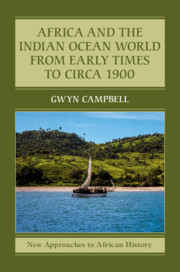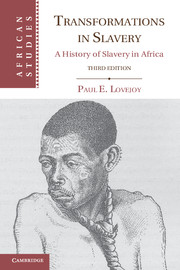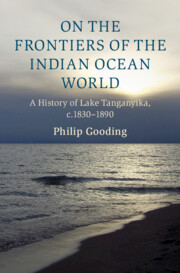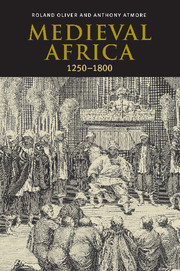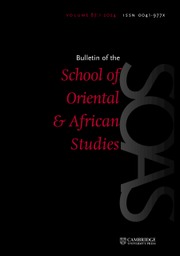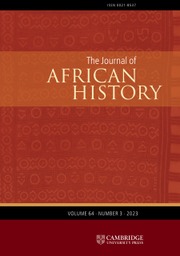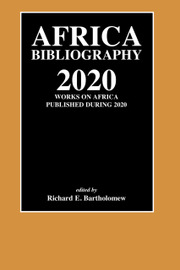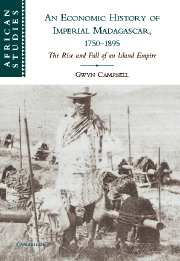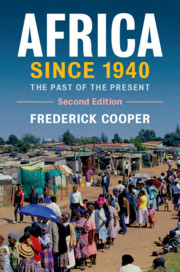Africa and the Indian Ocean World from Early Times to Circa 1900
Part of New Approaches to African History
- Author: Gwyn Campbell, McGill University, Montréal
- Date Published: September 2019
- availability: Available
- format: Hardback
- isbn: 9780521810357
Hardback
Other available formats:
Paperback, eBook
Looking for an inspection copy?
This title is not currently available for inspection. However, if you are interested in the title for your course we can consider offering an inspection copy. To register your interest please contact [email protected] providing details of the course you are teaching.
-
The history of Africa's historical relationship with the rest of the Indian Ocean world is one of a vibrant exchange that included commodities, people, flora and fauna, ideas, technologies and disease. This connection with the rest of the Indian Ocean world, a macro-region running from Eastern Africa, through the Middle East, South and Southeast Asia to East Asia, was also one heavily influenced by environmental factors. In presenting this rich and varied history, Gwyn Campbell argues that human-environment interaction, more than great men, state formation, or imperial expansion, was the central dynamic in the history of the Indian Ocean world (IOW). Environmental factors, notably the monsoon system of winds and currents, helped lay the basis for the emergence of a sophisticated and durable IOW 'global economy' around 1,500 years before the so-called European 'Voyages of Discovery'. Through his focus on human-environment interaction as the dynamic factor underpinning historical developments, Campbell radically challenges Eurocentric paradigms, and lays the foundations for a new interpretation of IOW history.
Read more- Puts forward a unique theory which looks at the importance of human-environment interaction as the central dynamic of historical change
- Radically challenges Eurocentric perspectives
- Proposes a new view of the history of Africa's relations with the outside world - relating it to the Indian Ocean world
Reviews & endorsements
'Africa and the Indian Ocean World from Early Times to Circa 1900 is a path-breaking work that integrates Africa into the history of the Indian Ocean world (IOW) in innovative and unusual ways. In its sweep, it offers us one of the most compelling narratives of environmental and social dynamics that underpinned the making of a macro-region and of Africa's dynamic relationship with it. In its methodology, it makes full use of environmental history to define and delineate the articulation of the IOW. Moreover, in its analytical focus, it alters conventional understandings of the history of the IOW, too often seen in terms of South Asian centrality or of European hegemony. The volume effectively interrogates existing modes of periodization, excavates the nitty-gritty of human-environmental interactions in the region and takes a fresh look at phenomena such as slavery and colonisation from a predominantly African perspective.' Lakshmi Subramaniam, Institute of Advanced Studies, Nantes
See more reviews'Campbell succeeds in writing a compelling history of Africa's historical relationship with the Indian Ocean world by placing human-environment interactions centre stage. Without falling into a geodeterministic argument, he vividly illustrates how planetary forces have contributed to the dynamics of an Indian Ocean world global economy. This volume not only shows the limits of prioritizing humans as agents of historical change, it also highlights the potential of going beyond conventional Eurocentric periodization. Hence, this book is of great value for historians and Indian Ocean world scholars, as well as for current conceptual debates on human-nature relations more generally.' Julia Verne, Rheinische Friedrich-Wilhelms-Universität Bonn
'This short book serves as a fine introduction to the integration of the Indian Ocean world into Africa's history. Starting before the onset of the Common Era, it extends chronologically to the onset of the modern colonial era in the 'Scramble for Africa', and geographically as far north as Egypt. Numerous maps, tables, and illustrations are helpful for an understanding of the text. In the Annaliste tradition, Campbell considers that long-term demographic and economic trends were generally more significant than short-term political and military events. He thus rightly places much emphasis on environmental history, in a dialectical interaction with humans occupying the land. Climate, seismicity, and diseases of people and animals take pride of place, with human activity especially influencing climatic change, but also causing famines through military operations. The European periodization of 'mediaeval' and 'early modern' is questioned. And, in opposition to Eurocentric historians, the author firmly stresses the agency of indigenous Africans within the region.' William G. Clarence-Smith, School of Oriental and African Studies, University of London and Chief Editor of the Journal of Global History
'Even those who are only loosely familiar with the history of Egypt, the 'Swahili coast', the Horn of Africa, and Madagascar will benefit from this densely packed story of the region … illuminating … Highly Recommended.' J. R. Kenyon, Choice
'This is a powerful book made more impactful by its timeliness. It is a historical book that deepens our understanding of the ecological implications of colonialism, while simultaneously supporting new scholarship on extremely important, contemporary issues around social justice, disenfranchised communities, and role played by African peoples in the process of shaping the modern world.' Krish Seetah, African Archaeological Review
'… this is a powerful book made more impactful by its timeliness. It is a historical book that deepens our understanding of the ecological implications of colonialism, while simultaneously supporting new scholarship on extremely important, contemporary issues around social justice, disenfranchised communities, and role played by African peoples in the process of shaping the modern world.' Krish Seetah, African Archaeological Review
Customer reviews
Not yet reviewed
Be the first to review
Review was not posted due to profanity
×Product details
- Date Published: September 2019
- format: Hardback
- isbn: 9780521810357
- length: 316 pages
- dimensions: 235 x 157 x 19 mm
- weight: 0.64kg
- contains: 21 b/w illus. 22 maps
- availability: Available
Table of Contents
1. Introduction
2. Africa in the making of an IOW global economy
3. Indian Ocean Africa in the first great upswing in the Indian Ocean world global economy, 300 BCE to 300 CE
4. Economic instability, c.300 to 900 CE
5. The second great boom in the IOW global economy c.850 to 1250 and its Impact in Northern IOA
6. Southern IOA and the second upsurge in the IOW global economy
7. Uncertainties and European intrusion: the IOW global economy, 1300 to 1830
8. The European impact in Indian Ocean Africa, 1500 to 1830
9. The international economy and Indian Ocean Africa
10. Indigenous modernisation in Indian Ocean Africa: Egypt, Imerina, and Ethiopia
11. The scramble for Indian Ocean Africa
12. Africa and slavery in the Indian Ocean world.
Sorry, this resource is locked
Please register or sign in to request access. If you are having problems accessing these resources please email [email protected]
Register Sign in» Proceed
You are now leaving the Cambridge University Press website. Your eBook purchase and download will be completed by our partner www.ebooks.com. Please see the permission section of the www.ebooks.com catalogue page for details of the print & copy limits on our eBooks.
Continue ×Are you sure you want to delete your account?
This cannot be undone.
Thank you for your feedback which will help us improve our service.
If you requested a response, we will make sure to get back to you shortly.
×
